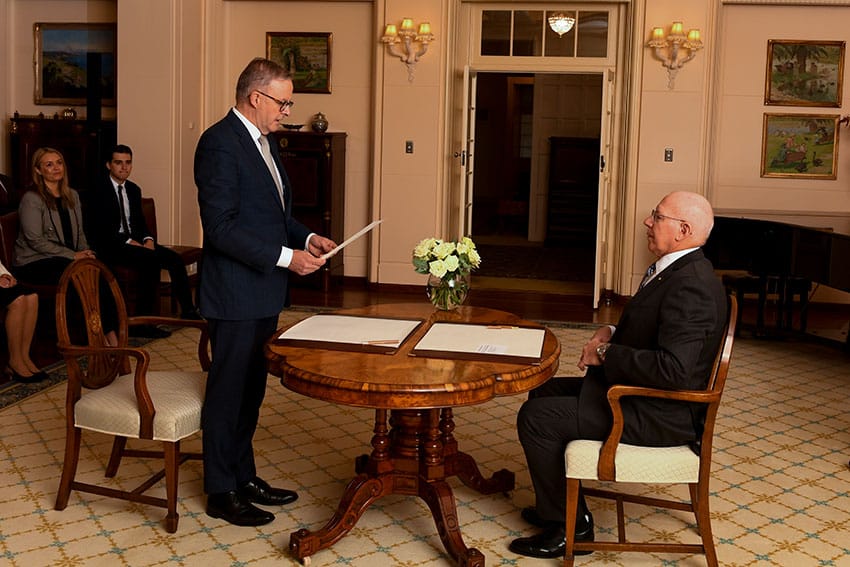
Now the election has been held and Scott Morrison and the Liberal/Nationals have been replaced by Anthony Albanese and the LGT alliance (the Labor, Greens, Teals alliance) what are the lessons to be learned?
There’s no doubt, as detailed by Wanda Skowronska in her chapter in Christianity Matters launched recently by Tony Abbott, Christianity and Christians in Australia and globally face an increasingly hostile environment. The results of the recent federal election suggest the situation will not improve.
While before the election Tanya Plibersek and Anthony Albanese made much of their commitment to Christian beliefs and teachings, we now face a very different situation where Teal independents and radical Green members of parliament will pressure the Labor government to enforce a strong anti-religious agenda.
The new Green influence
If, as looks likely, the Greens hold the balance of power in the senate then their demands on the Labor government to implement their raft of extreme secular policies will prove irresistible.
The failure to pass the religious freedom bill in the last term of government means any legislation put before the new parliament will adversely impact on the right faith-based schools and other institutions have over employment.
Both the ALP and the Greens will ensure religious bodies no longer have the protection of exemptions to anti-discrimination laws. Given the official policies of both the ALP and the Greens Australians can also expect a radical LGBTIQ+ agenda in areas like the right to gender transitioning and promoting neo-Marxist inspired gender ideology in schools.
Problems for religious schools
The policy blueprint for Australian schools is the Council of Australian Governments’ National School Reform Agreement due to end December 2023. When re-negotiated, much like what occurred under the Rudd/Gillard governments, the most likely scenario is that religious schools will face ever increasing bureaucratic interference limiting the autonomy they have to best represent their communities.
Although school funding is set ahead of time to 2027, there is likely to be increasing pressure exerted on the commonwealth government, currently responsible for approximately 80 per cent of funding to non-government schools. ALP supporters like the Australian Education Union have long argued so-called wealthy non-government schools must suffer a cut in funding.
Central to the Teals campaign that decimated the Liberals in seats like Kooyong and Wentworth is the argument the world will soon end unless Australia drastically reduces its carbon footprint (currently at 1.3% of the world’s emissions).
The new religion: climate change
Another of the key lessons explaining the change of government is that anthropomorphic climate change is the new secular religion. While, as argued by the Bible and championed by Pope Francis, Christians have a moral duty to care for the environment what is occurring now represents a fundamental change.
Instead of nature being God ordained adherents worship the Gaia with a passionate zeal normally reserved for Christian martyrs and saints. In place of the Bible climate activists worship Al Gore’s The Inconvenient Truth and the infallible diktats issued by the Intergovernmental Panel on Climate Change.
The Swedish teenager Greta Thunberg is worshipped as the climate change saint and any who question climate change orthodoxy are condemned as sinners.
The philosopher who knew
Unlike Christianity though, where man’s fallibility is recognised, the new climate religion is doctrinaire and unequivocal in endorsing what the Italian philosopher and cultural critic Augusto Del Noce describes as scientism.
De Noce in his essay Toward a New Totalitarianism describes scientism as a secular, totalitarian world view that negates religion and sees itself as “the only truly valid from of knowledge”.
A form of preeminent knowledge where “every other form of knowledge – metaphysical or religious – expresses only subjective reactions”. Such is the power of science that literally hundreds of variables can be used to create computer modelling with the power to define exactly what is causing climate change, what will happen in 10, 20 and 30 years and what action must be done to save the planet.
Not by bread alone …
Ignored is science is not absolute as every hypothesis is continually tested and re-examined and it only takes one scientist to provide contrary evidence for what appears to be certain to be seen as doubtful.
During the election campaign both major political parties focused on the state of the economy post-Covid and who would be the best economic and financial manager at a time of record debt and increasing global uncertainty. But as the Bible says: “Man shall not live by bread alone”.
The British cultural critic Roger Scruton makes the same point in his book Conservatism when he writes political parties, especially those calling themselves conservative, must articulate a convincing narrative detailing what motivates them and what they see as their inherent values and beliefs. Scruton writes conservatives, in particular, need to re-establish “confidence not in our political institutions only, but in the spiritual inheritance on which they ultimately rest”.
Related
